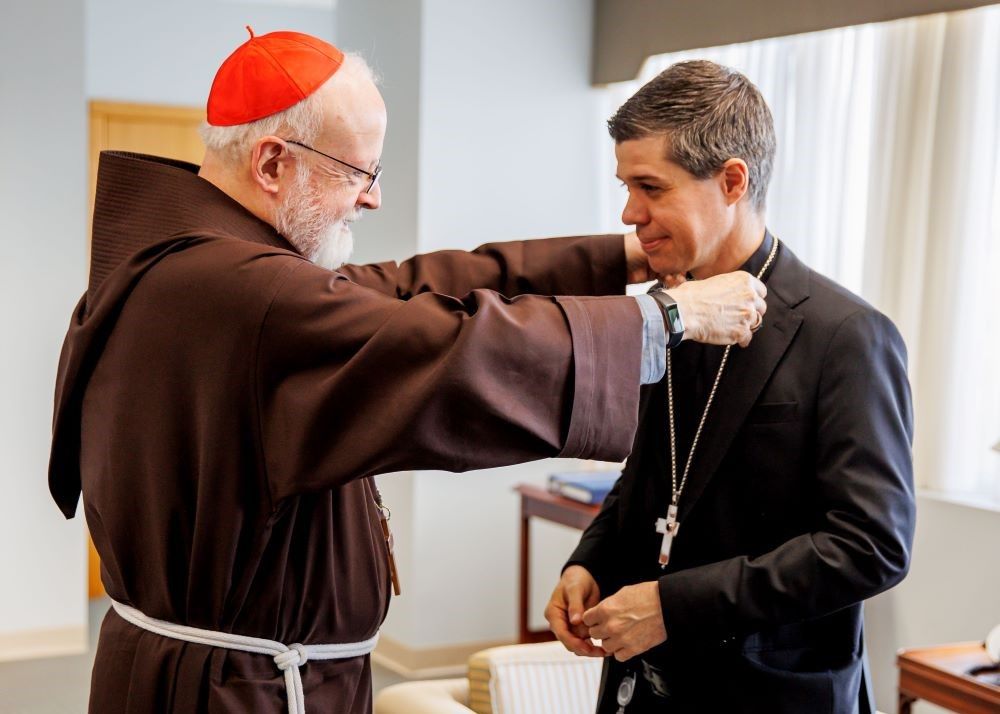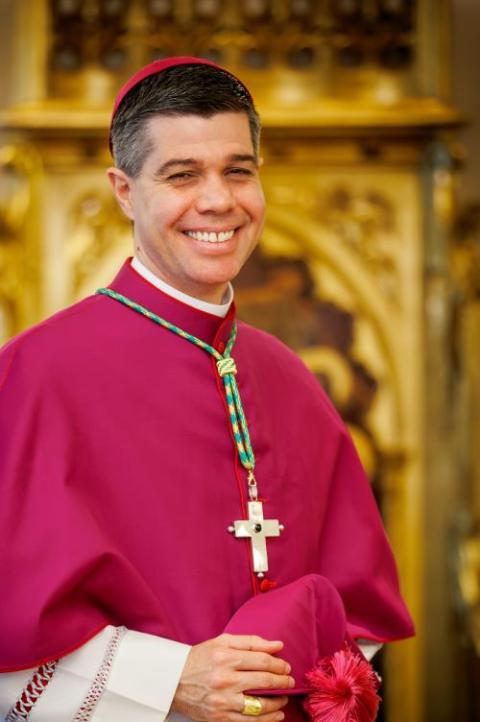
Cardinal Seán O'Malley of Boston gives Bishop-designate Cristiano Barbosa his pectoral cross at the Archdiocese of Boston's pastoral center in Braintree, Mass., on Dec. 9. Barbosa was consecrated as an auxiliary bishop in Boston on Feb. 3. (OSV News/The Pilot/Gregory Tracy)
Boston's Fr. Cristiano Barbosa was consecrated on Feb. 3 as a new auxiliary bishop for the archdiocese. He is Boston's first Brazilian-born bishop and is the second Brazilian-born bishop in the United States.
Born and raised in Brazil, Barbosa was ordained for the Diocese of Bauru in 2007. He came to Boston in 2008 to study at the Boston College School of Theology and Ministry, where he earned a licentiate in theology and a doctorate in sacred theology. He has served the Brazilian and Portuguese-speaking communities of the archdiocese since his arrival, and was incardinated into the archdiocese in 2021.
Barbosa is currently the secretary for evangelization and discipleship as well as episcopal vicar for the central region of the Boston Archdiocese, roles in which he plans to continue as bishop. At 47, he is the second youngest U.S. bishop.
"I'm asking God for all the graces I need to serve, and to serve better, to be a good bishop," Barbosa said in a recent NCR interview. "People ask me my mission, and my mission is to support [Boston Cardinal Seán O'Malley] in his mission."

Bishop Cristiano Barbosa, a native of Brazil, was consecrated as an auxiliary bishop in Boston on Feb. 3. (Courtesy of The Pilot/Gregory Tracy)
"Mission and evangelization are words that have to be uppermost in our minds," said Barbosa. He said that when people think about "mission," they often think of some far-off country, and not their own neighbors.
Barbosa joins four auxiliary bishops ministering to a diocese of more than 1.8 million people. "We are so grateful to Pope Francis for recognizing our pastoral needs and giving us a new auxiliary bishop," O'Malley said in his homily at the consecration.
"I'm very pleased and encouraged by his appointment," Fr. Paul Soper, the archdiocese's secretary for ministerial personnel and director of clergy personnel, told NCR. "This has always been an immigrant diocese, is certainly an immigrant diocese right now, and our immigrant population is crucial to our future and increasingly a centerpoint in the life of our diocese."
The consecration ceremony reflected this diversity: The first reading was in Vietnamese, the psalm was in Spanish, and the second reading was in Haitian Creole, with the Gospel in English. Barbosa addressed the congregation afterward in Portuguese, English and Spanish. After the procession of clergy, a statue of Our Lady of Aparecida, the patroness of Brazil, was carried up to the chancel. Some congregants waved a Brazilian flag.
One challenge the diocese faces in serving the needs of immigrants is a lack of non-English speaking priests, both in general and in the specific communities where the newcomers are currently living.
"Parishes often reflect a different demographic and haven't caught up," Barbosa told NCR.
Advertisement
Immigrants often move from community to community as they seek new opportunities and become more prosperous, and the Masses offered in a particular language at one parish may not best serve today's population, Barbosa said.
It can be especially difficult to know where large communities of Brazilian immigrants live, as they often are designated as "white" or "Hispanic" in government data, he said.
He estimated 120,000 to 360,000 Brazilian immigrants live in the diocese.
The Archdiocese of Boston serves both Brazilian- and European-Portuguese speakers, as well as a large community of speakers of Cape Verdean Creole (a Portuguese-derived Creole language) and a smaller community of Portuguese speakers from Mozambique.
At St. Anthony of Padua Parish in Cambridge, Massachusetts, separate Masses are offered for the Brazilian and the European Portuguese communities. "It's usually the same priest, but the music is very different," Barbosa said. European Portuguese immigrants usually prefer organ and Brazilians usually prefer piano and guitar, he said.
Portugal and Brazil also use different missals. "People need to feel they are at home," said the new auxiliary bishop.
Barbosa said he hopes that by talking more about vocations and the sacrifice of the Mass with young men from Brazilian (and Latino) immigrant parishes, they will be able to raise up more priests who can offer services in Portuguese and Spanish.
"The message doesn't always get to these communities," he said.




